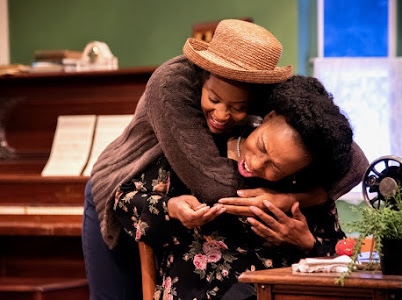I brought my tissues for this production because I wasn’t sure how deep they would go into the disparities into Blacks during the Harlem Renaissance. The Harlem Renaissance was a time of changing the way Blacks were perceived however just like with things today, having white people open their eyes to have amazingly educated, and worthy that we are is still an ever-present issue. Rachel played by Jessica Johnson is one of those productions that is almost predictive of the struggles we would fight. Set in 1915 this film is like the light bulb to our time now. NAACP commissioned Angelina Grimke to write this from the perspective of Blacks to the audience of Whites so that it could open the eyes of them in hopes of change. Grimke and her sister are first generations whose grandfather was a slave. The vision that education would be the key to making a better life was and is now a tool that many thoughts would provide a better life. However, with Rachel we see how we are seen-dirty, ugly, and useless outside of servitude. My review is going to draw on so many parallels that I saw and how I felt. This was directed by Alexandra Espinoza who I knew I had seen before and realized I recognized her from Azuka Theatre’s Boycott Esther which I had written a blog post for.
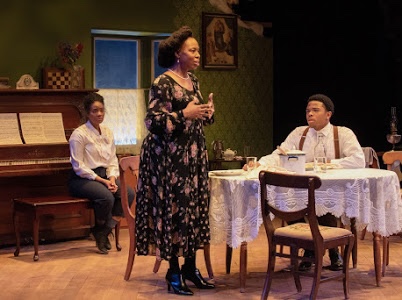
Trauma
This all-star studded and all Black cast brought the emotions that was felt from start to finish. One of the first things that touched me was Rachel’s optimism. She made me feel like she was my daughter. My own daughter’s optimism is super affectious. She is happy and go lucky. You see her and Ma Loving going back forth like typical mother and daughters do. I noticed the uneasiness in how Ma Loving showed. Immediately I knew there was some trauma that wasn’t being told. It was in the way that Ma Loving interacted, her word choices, and her body language. I want to take this time to talk about that for a moment. The way we interact with our children matters. Sometimes our own traumas and pain can be transferred to our children. I know for me on a personal level my own trauma was heightened when I had my first child. Something about childbirth that pulled on me and immediately I had the mindset to get into therapy. I saw no way that I could parent without out. How many parents do you know today with their traumas that have been unresolved that is being projected onto their own kids?
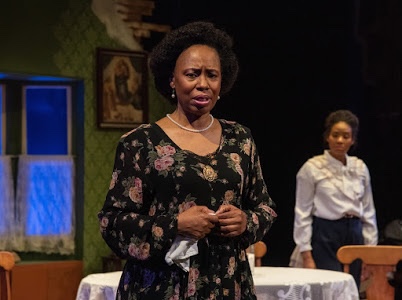
Breaks
Zuhairah McGill plays Ma Loving and I recently saw her in the production of DOT at People’s Light. She plays the heck out of Ma Loving. I saw my mother in her. Pushing through after the lynching of her husband and son 10 years earlier. This is the trauma that comes out that she kept from Rachel and her brother, Tom played by Travoye Joyner. Once this trauma is revealed you see an immediate change in Rachel and Tom but especially Rachel. Rachel whose dream is to have a lot of children and provide a safe space is no longer there in its same glorious light. She still despite her killed dreams pushes through and takes a liking to Lil Jimmy the neighborhood kid who even in his relationship pulls further on the trauma of Ma Loving as well as contributes to the trauma to Rachel. As they all heal or attempt to heal the breaks is still present and you see Rachel unfold.
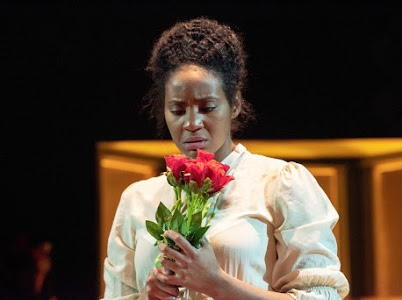
Birth or not to birth
Now even though the play centers around Rachel who decides to not have children of her own because of the pain that birthing children into the world where they could be called such things as Niggers, killed, or beaten parrells today. I think about my children as evil as it is in general its that much worse because they are black. I must have conversations with my kids that white people don’t have to have. Even my 8-year-old son has been taught what to do when he is approached by a police officer. Keep his hands present, be polite, answer with the upmost respect. Don’t step out of line in word or deed so that he can come home and yet, he’s here. I love him and my daughters and couldn’t imagine life without him but the fear that maybe if I hadn’t had children I wouldn’t have to bear the stress that I have when they aren’t in my sight is real and traumatic and a fear that ALL blacks feel. It doesn’t matter if we are law abiding citizens or college educated, we are in this world where even after all this time are devalued and made to feel less than our counterparts. This is the fear that Rachel has and because of her father and brother being lynched has decided to never have children. One of the things that I loved at seeing Rachel this past Sunday is that they had a after talk and pretalk about the production. I heard some of the audience think that Rachel was fragile when I see her just like most black mothers, she is strong, unraveling but during her unraveling she wakes up and does what she must.
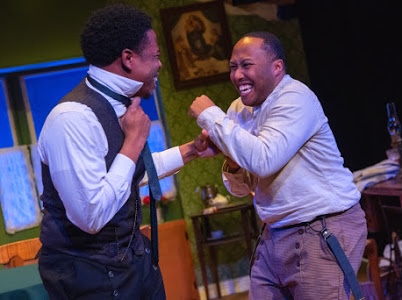
Cries in the dark
Little Jimmy experiences his first insult to his being. He is called Nigger. He didn’t do anything wrong. He just simply existed. I have blogged this many time, I was a straight A student since the 2nd grade. I had a student call me a Nigger to my face and for what? I had nothing wrong. This was in the early 90s. My own teacher changed my name from LaToi to Denise because my name was too ethnic for him to remember. I also had grades changed because college wasn’t on the horizon for me. I am personally afraid for my own kids. It hasn’t gotten so much better that the ideal of this becoming their reality is gone. I can’t think that because my husband and I are both college graduates, homeowners, and affluent that they will escape what Jimmy experienced. The media paints racial divide as a choice only given to the Blacks who gang bang and commit crimes but do police or others have a way of choosing just “those Black” folks? Not that I am aware of.
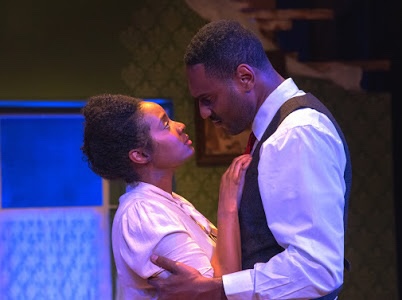
Come with me
Rachel is fancied by the neighbor John Strong played by newcomer Walter Deshields. He at first comes in and you can see some sparks between the two. We find out that he goes and buys a flat for him and Rachel to raise a family and become one. Rachel’s decree to never have kids is something she tells him and then lets him know that because of this decree she can’t unite with him. She can’t bring herself to be there for Little Jimmy and have children seeing the despair it has brought to know that kids are being attacked for no reason simply because they are black. I watched the audience clutch their imaginary pears as Jimmy cried out in his nightmares reliving the moment he was devalued repeatedly. How much more for the other children in this world? They don’t understand why the kid who was taught racism at home is piercing at him like he’s a science experience. Why the girl has someone petting her hair as if her hair is some nuance. These things matter. These things hurt. Rachel is complex. There are a lot of things that are seen when you see the breakdown between Camiel Taylor who plays both Ethel and Louise who is broken. Her mother, Nia Colbert who plays Mrs. Lane is in despair but again she is doing what she can to provide a better life for her child even if that means living where she can’t afford. You see this mental break down and I resonated with that. My parents moved us from a nice neighborhood to one that wasn’t as nice just because the nicer neighborhood practically moved us out with the breakdown of how they treated us. Stay in the nice neighborhood and watch your child be called everything but a child of God or go to a lower neighborhood so we can be with likeminded individuals? The choice is hard. I want to give it up to young Jimmy played by Donavan Bazemore.
Unpacking
So much to unpack. So much to take in but Grimke was before her time. She understood and wrote this production from the pain of all Black people who know how real this is. This is everyday being Black. As many people want to act like we have arrived because there is more advancement it won’t be right until no child or adult is broken down simply from being born. Is it better to take the child out or watch them die slowly? Rachel gives us a glimpse into the slow death of our people. I need all of us to see this. Talk about it. Be an ally if you aren’t Black. Don’t just watch and clutch your pearls and say how shameful it is if you have no intentions in speaking up amid your own friends and family about the inherent racism that still exists.
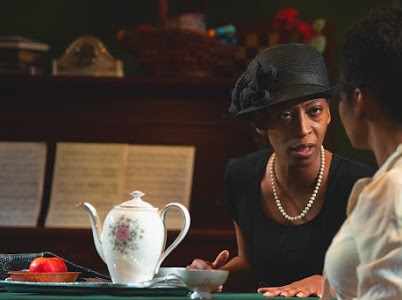
Rachel is showing until February 23rd! Quintessence Theatre is locate at 7136 Germantown Avenue in Philadelphia PA! Thank you to Carrie Gorn, Quintessence Theatre and Aversa PR for having me!
